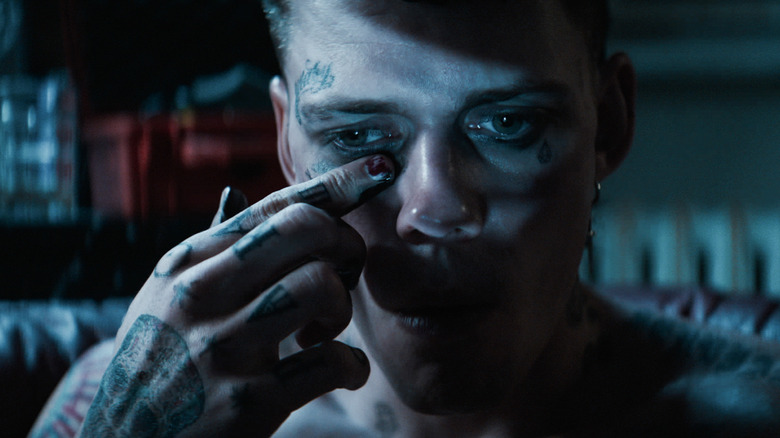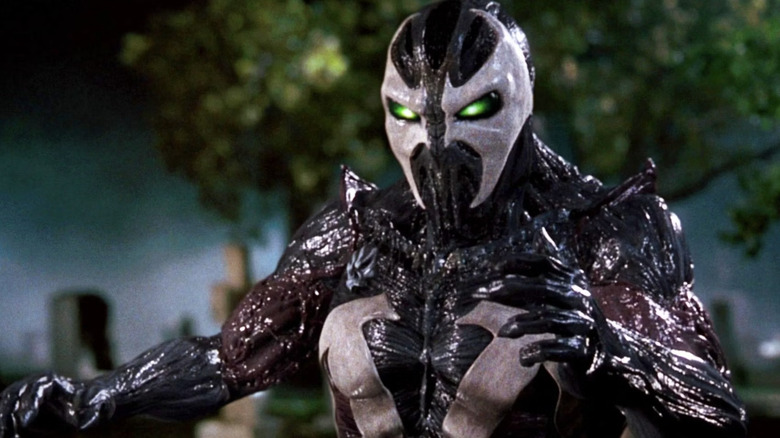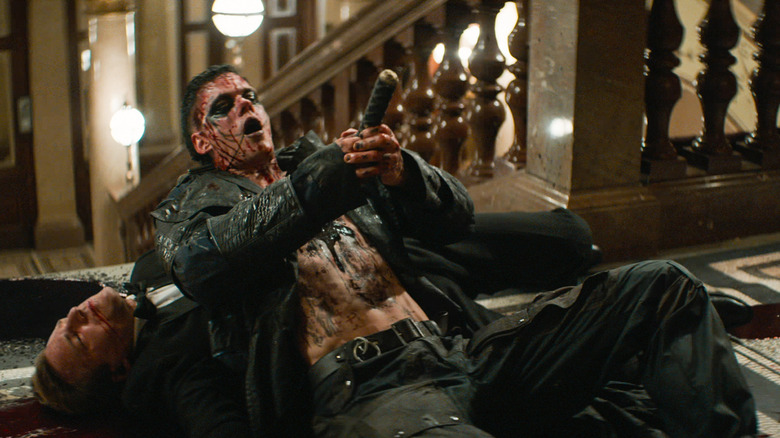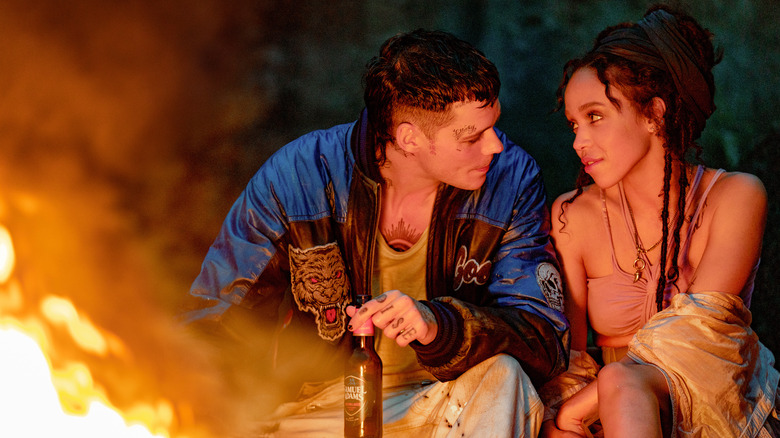The Crow 2024 Resembles An Infamously Reviled '90s Superhero Movie (And That's Not Necessarily A Bad Thing)
This article contains mild spoilers for "The Crow."
It makes logical sense why a consensus of opinion is such a desired thing. Our lives in this world are finite, and free time is a luxury in a capitalist society, so most folks don't want to waste their time on books, music, television, or films that most people generally seem to hate. However, there's just no greater drug-free high for a film addict than to take a chance on a movie whose reputation is in the toilet, only to emerge having had a decent time with it. These movies don't have to be Actually Good, they don't have to be hidden gems or unsung masterpieces (though some of them absolutely can be!); they just have to be Not Trash. Yes, this can happen with reappraisals when they fall into the rose-colored purview of nostalgia, but it can also happen when you free yourself from the tyranny of consensus and make up your own damn mind.
Right now, many people on Al Gore's internet are dunking on 2024's "The Crow" for all manner of reasons. Whether they're devotees of the 1994 film, have been loosely following the reboot's decades-long journey through development hell, are laughing at star Bill Skarsgård's Machine Gun Kelly-meets-Jared Leto's Joker getup, or are rolling their eyes at an attempt to theatrically revive a direct-to-video franchise, there are numerous reasons why the movie has become an online punching bag. Here's more fuel for the fire: "The Crow," in its themes and structure, strongly resembles another comic book action-horror movie that became a punching bag: 1997's "Spawn." But, if you turn down the peanut gallery and give these films a chance, you could find that there's still some fun to be had with them.
Spawn, The Crow, and the joy of action-horror
It wasn't all that long ago that horror used to be a dirty word in reputable cinephile circles, as it's only been the last couple of decades that have seen the genre's popularity rise so high as to no longer be easily dismissed. The combination of action and horror, as opposed to comedy and horror, is relatively new. It still tends to confound some folks who can't vibe with a film that contains fights, explosions, demons, and blood. Perhaps that's because it's easier for these people to wrap their heads around films that either start as one and transform into the other — "Predator" and "From Dusk Till Dawn," for instance — or seem to favor one element over the other, like "Aliens" or "Army of Darkness."
The original "The Crow" was one of the first instances where the film's blend of genres didn't see one in particular become dominant: its equal parts comic book, action, film noir, horror, and Gothic romance. That genre mash-up quality became hugely influential, leading to similar efforts such as "Blade" and "Underworld" as well as new cultural milestones like "The Matrix." "Spawn" is one of these former examples, a clear offspring of "The Crow" in its aesthetic aims which, along with the comic book it's adapted from and the animated series it also (sorry) spawned, helped lead to the "Blade" films and other action horror flicks. Unlike other action horror movies about zombies or vampires that can downplay their horror trappings a bit, "Spawn" is unabashedly horror-themed, featuring a titular character (played by Michael Jai White) who looks like a mash-up of Freddy Krueger and a Romero zombie, even as he flies around with a sentient cape (necroplasm armor, thank you very much), shoots guns, and is adept at martial arts.
The concept of a man brought back from the dead who, along with being resistant to mortality, has new physical combat abilities, is a central aspect to both "The Crow" 1994 and 2024. In each case, it's the empowering wish fulfillment as seen in comic book superhero narratives mashed up with the poetic justice and revenge aspect of the Gothic, as seen in many of the classic Universal monster characters. Action and horror are probably too generally viewed as lowbrow genres by themselves, so their combination is unsurprisingly frowned upon. Yet if one embraces it, each genre only fantastically enhances the other.
Faust, but with clown demons and vivisections
Both "Spawn" and "The Crow" 2024 build their gun-fu, demonic gore, and other assorted genre elements around the same compelling classic of German literature: Johann Wolfgang von Goethe's "Faust." Goethe's story, about a man who makes a pact with the Devil in order to have the closest experience of transcendence on Earth (which in his case involves being deeply in love with a woman, Gretchen), is a building block of both the Gothic and horror genres. As such, the story's elements turn up in some form or another in numerous places, most commonly reduced to the idea of a person committing some horrible act in the name of lust and/or love. In "Spawn," the "Faust" allusions are pretty much 1:1, as Al Simmons aka Spawn is propositioned by a demon from Hell named Malebolgia (played by Frank Welker and some of the dodgiest CGI the '90s had on offer) after his untimely demise. Malebolgia offers Spawn a Faustian deal whereupon he may return to the real world and see his widowed wife, Wanda (Teresa Randle), and also get revenge on his killers if he'll only agree to become the demon's servant and lead his armies for eternity. As is typical of this type of setup (as popularized by Christopher Marlowe's play "Doctor Faustus"), Spawn soon discovers that this deal is not all it's cracked up to be, and ends up breaking his pact and fighting against Malebolgia and his demon minions.
"The Crow" 2024 adds a few clever wrinkles to the Faustian legend, a choice indicative of its thematic interest in exploring the murky morality within its story. In "The Crow" 1994 (along with every "Crow" sequel prior to this latest film), the Crow is brought back from the beyond almost automatically because such an injustice had been done. Thus, he becomes imbued with supernatural powers and rules, chief among them being to stick to hunting down his killers and not mess with any other crimes or criminals. In Rupert Sanders' 2024 "Crow," Eric (Bill Skarsgård) is given a choice by an otherworldly spirit named Kronos (Sami Bouajila) to be returned to the world of the living to fight for the lost soul of his love, Shelly (FKA twigs), as well as break the pact between Hell and the evil Vincent (Danny Huston), who's been sending innocent souls to Hell as part of his own demonic deal. Initially, Eric is told he and Shelly can come back to life when he completes his mission if his love remains pure. When Eric starts to doubt his love for Shelly, he offers Kronos one final deal: his soul for Shelly's, meaning that he'll be a servant of the afterworld forever. It's a pact that is not only Faustian but reminiscent of the Greek myth of Orpheus and Eurydice. All of this thematic material helps give "Spawn" and "The Crow" extra emotional power and verve, the better to buy into the films' respective outrageous action sequences and bloodletting.
Never underestimate the power of a great soundtrack
It would be too charitable to describe either "Spawn" or "The Crow" as flawless, seeing as how both films have their own handful of trouble spots, leading to their less-than-stellar reputation. Yet it feels disingenuous to dismiss the notion that each movie has something enjoyable to offer too. While reaching a consensus about what those good bits are is a matter of taste, it feels safe to say that both movies feature fantastic soundtracks. While the concept of a hit soundtrack is a bit rarer these days (especially the tie-in soundtrack album), one cannot underestimate its power to lift a flawed film up to enjoyable status. Would "Flash Gordon" or "Highlander" have as much cult movie cred as they do without the majestic work of Queen? What's "Tron Legacy" without that beloved Daft Punk score? Riddle me this: what is more beloved, "Batman Forever" or its soundtrack album?
In the case of "Spawn," its soundtrack album is famous for being one of three "mash-up" tie-in albums produced by Happy Walters. Following "Judgment Night" and preceding "Blade II," the "Spawn" album sees collaborations between electronic music acts and heavy metal/alternative bands: The Crystal Method and Filter, Korn and the Dust Brothers, and The Prodigy and Tom Morello, amongst others. Not only does this lend the album and the film itself a unique and distinctive sound, but it also feels like a piece with the movie's aesthetic. With its loud, harsh edginess combined with emotive songwriting, the music enhances the story and characters which otherwise may have been lacking.
The "Spawn" score is by Graeme Revell, who also composed the evocative music for the original "The Crow," itself famous for having a soundtrack album full of Goth and Industrial bands. The album was influential enough that a "Crow" soundtrack became a series staple, and while "The Crow" 2024, as of this writing, does not have its own tie-in album, it absolutely puts its score and needle drops front and center in a similar fashion. Joy Division's "Disorder" and Gary Numan's "M.E." lend the film its Goth bonafides, and combined with newer tracks (including one from the likes of its co-star, FKA twigs) and the moody, electronic-tinged score from Volker Bertelmann, the film gets a vibe from its music that propels the movie through its slower moments. While "The Crow" 2024 is more of a reimagining than a straight remake of the 1994 film, the fact that it has all these similarities with "Spawn" (one of the cinematic children of the original "Crow") is proof positive that it exists on the same spectrum. In the case of both films, you may end up agreeing with the consensus and they may not be to your taste, but you'll never know if you don't give 'em a try.
"The Crow" is in theaters everywhere.



